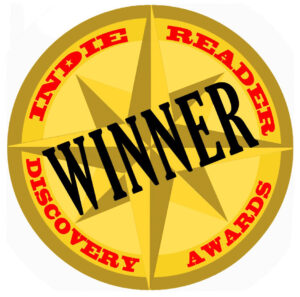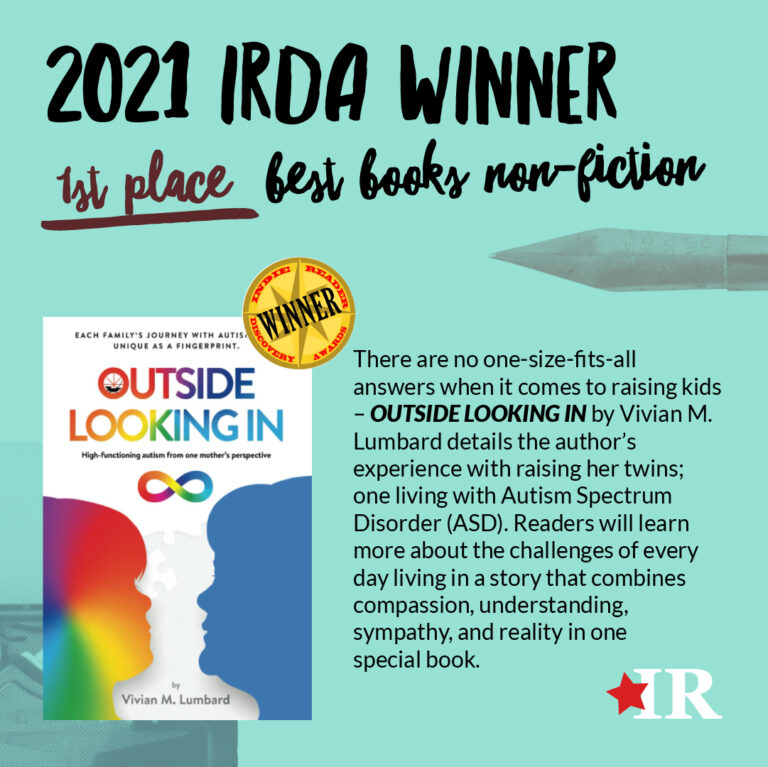
Outside Looking In was the FIRST PLACE non-fiction winner of the 2021 IndieReader Discovery Awards, where undiscovered talent meets people with the power to make a difference.
Following find an interview with author Vivian M. Lumbard.
What is the name of the book and when was it published?
Outside Looking In: High-functioning autism from one mother’s perspective. Published: September, 2020
What’s the book’s first line?
Not sure which one you’d like. 🙂
Introduction: If you are reading this book, then you probably want to further your understanding of Autism Spectrum Disorder (ASD).
Chapter 1: “Once upon a time, in a land not so far away…”
What’s the book about? Give us the “pitch”.
Think about autism differently. Go beyond awareness and acceptance and reach understanding. Families, educators and health care professionals can all benefit from this easy to read, common-sense, compassionate book by a mom who has twins with autism challenges. Outside Looking In advocates working to understand the underlying causes of why autistics may act/react the way they do, as well as loving and raising the whole child. It draws parallels to neurotypical behaviors to show that perceived differences aren’t so different after all. For those just learning about autism, they’ll discover they aren’t alone, and for those with more experience with autism, they may discover there is more for them to learn.
What inspired you to write the book? A particular person? An event?
Love for my children and promoting autism understanding were my primary reasons for writing Outside Looking In.
What’s the most distinctive thing about the main character? Who-real or fictional-would you say the character reminds you of?
The main character is someone who is happiest marching to the beat of a different drummer, but feels a great deal of self-doubt and anxiety that she is constantly being judged by the wider world outside her home as not good enough because of her differences. She exhibits far more strength and bravery than she thinks she has. The character that is most reminiscent to that in my book–that’s a tough question–maybe the Cowardly Lion in the Wizard of Oz or Winnie the Pooh?
What’s the main reason someone should really read this book?
Anyone who wants to understand autism better, without feeling like they are reading a clinical text or being told there is only one correct path, should read this book.
If they made your book into a movie, who would you like to see play the main character(s)?
Oh, my children are so unique, I can’t even begin to wonder who would be best to play them onscreen! I’ll have to ask them if they have a preference.
When did you first decide to become an author?
I’ve been writing since I was a child (many, many moons ago!) and being a published author has always been on my bucket list. I had ideas that I thought were important to share and Outside Looking In was the result.
Is this the first you’ve written?
I have written blog posts, articles, newsletters and other shorter works intermittently over the last forty years. Outside Looking In is the first full-length book I’ve written and published.
What do you do for work when you’re not writing?
I am a happily retired air traffic controller. The pandemic, though, has had me professionally prompting my children repeatedly to please, please, please, keep up with their cyber courses! So, I guess stay-at-home mom with far too many interests would be the most accurate description now.
How much time do you generally spend on your writing?
I don’t have a set schedule. Some weeks can be very little time, while other weeks might be 10-15 hours. And there are still other weeks that can be well over forty hours. Some of that time is spent with research, social media, marketing/advertising–not just the act of writing something new or editing.
What’s the best and the hardest part of being an indie?
The best part is the amount of control you have over all the moving parts (editors, cover design, formatting, pricing, release dates, etc.) and the sense of accomplishment that you feel when it all comes together. The hardest part is marketing and getting the word out there to the right people that there’s this book that may be just want they want to read.
Would you go traditional if a publisher came calling? If so, why?
I might consider a hybrid scenario with some books self-published and others traditional. I don’t see myself going fully traditional because of the reduced royalties and loss of control of those moving parts, but I think I would consider it for some future books for the increased experience/knowledge that I would gain in another area of publishing.
Is there something in particular that motivates you (fame? fortune?)
Advocacy in some form that makes a reader think while it also entertains is what motivates me to write. Outside Looking In advocates for autism understanding and I’m in the middle of writing another non-fiction book about better supporting neurodiversity in the workplace. I’ve also begun a historical fiction series following a family through the generations highlighting women’s issues with a bit of a twist. I don’t consider myself a write-to-genre author, but rather a write-to-communicate, educate and entertain author. I am happiest when my words resonate with readers. If my readers ponder, even if they don’t necessarily agree with me, and generate their own new ideas, I consider that a success.
Which writer, living or dead, do you most admire?
Oh, there are so many that I admire, but if I had to narrow it down, Harriet Beecher Stowe, Mark Twain and Terry Pratchett would top my list in some order. Harriet Beecher Stowe for her achievements as a female author in the early 1800s and her advocacy for social change. Mark Twain for his varied life experiences, humor, wit and relatable depiction of life and human motivations. Terry Pratchett for his wry, satirical humor and modern social commentary–all in a fantasy world.
Which book do you wish you could have written?
The Stand by Stephen King – I could not put it down the first time I read it; I was up all night! It had my undivided attention and stayed with me long after I read it.
